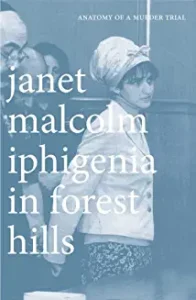Iphigenia in Forest Hills: Anatomy of a Murder Trial by Janet Malcolm 2011
Malcolm, who died in 2021 was, along with Joan Didion, one of the great women non-fiction writers of the last 50 years. Writing for The New Yorker, she published books about wide ranging topics from Chekhov to psychoanalysis, from Sylvia Plath to Gertrude Stein, from the art world to the ethics of journalism.
In this work, Malcolm skips writing about a journalist and a murder trial as she did with Joe McGinnis and Jeffrey McDonald and writes about the trial herself. It was a sensational trial covered nationally, and Malcolm was there in real time, attending each hearing and writing in detail about the defendants, the attorneys, the judge, the courtroom, and the other reporters covering the trial.
The facts of the case were straightforward. Daniel Malakov a successful orthodontist who had been born in Uzbekistan, a member of the Bukharan-Jewish community, was murdered in broad daylight, shot three times in the chest at a Queens playground while his 4 year old daughter looked on. His estranged wife with whom was locked in a bitter custody struggle over their child was arrested for hiring a cousin to murder her husband. The wife was also a Bukharan Jew who was an internal medicine specialist. Both the husband and wife had extended families who attended the trial and hated each other. Dr. Borukhova and her cousin Mikhail Mallayev were convicted and sentenced to life without parole. They lost on appeal and remain in prison to this day.
Malcolm relates these events and facts in an objective and dry manner, but her commentary around the edges and her digging into the judicial and child welfare programs behind the scenes raised troubling questions about the convictions. As she wrote at one point in the book, “Yes, there was evidence against her…but everything one knew about life and about people cried out against the notion that this gentle, cultivated woman was the mastermind of a criminal plot”. At another point she added her personal opinion as she ‘struggled with the enigma of the case: she couldn’t have done it and she must have done it.”
Malcolm’s superb writing and reporting resulted in my feeling uncomfortable with the entire process which sent Bourkhova to prison for her entire life. The judge, the, DA, the law guardian, the psychologist who examined the child, and just about everyone else involved in the case apparently didn’t ‘like’ Dr. Borukhova, an aloof and cold defendant, and Malcolm implies that it was this dislike, this negative reaction to the defendant, that turned the decision against her. That and the fact that nobody ever identified another potential murderer or motive. But what a way to make life and death judgements! From the moment when the judge decided that Borukhova and Malleyev would be tried together rather than separately to his demand that the defense team do their summation with only a few hours notice so he could go on his scheduled beach vacation, from the mistranslation of a phone transcript which turned innocent words into incriminating ones to the testimony of the law guardian who had never even met his child client and was found by Malcolm to hold bizarre conspiracy theories, the entire process appeared to be tainted, but the judgement stood the test of an appeal and the two convicted individuals remain in prison more than 15 years later. As Malcolm observed about this messy process, “In life, no story is told exactly the same way twice. Only in trials is making it pretty equated with making it up.”
Was justice served? Did these two conspire to kill the orthodontist? What has happened to the daughter, Michelle Malakov, who is now a young adult? I would have loved to hear Malcolm’s take on these questions but to the best of my knowledge, she did not return to the topic of this trial and its outcome before she died.
Iphigenia in Greek mythology was the daughter of Agamemnon, the king of Mycenae and leader of the Greeks headed to Troy to kidnap Helen and bring her back home. When Agamemnon offended the goddess Artemis, she demanded the sacrifice of his daughter in order to restore the winds which carried the Greek fleet to the Trojan War. Clytemnestra and Iphigenia’s brother, Orestes avenged her murder by killing Agamemnon after he returned from Troy. So why did Malcolm choose to use the Iphigenia story, portraying Dr. Borukhova as Clytemnestra killing her husband because he had taken her daughter from her? Was she making the point that the judicial and child welfare system demanded the sacrifice of someone in order to deal with these events? I think Malcolm, too, was very uncomfortable with the outcome and titled her book ‘Iphigenia’ and not ‘Clytemnestra’ because she saw the removal of the child from her mother as the central event in the whole story.
Despite or because of this discomfort, this is a good read and a fine example of Malcolm’s artistry. I still wonder what has happened to all the Bukharan Jews in this tale.



